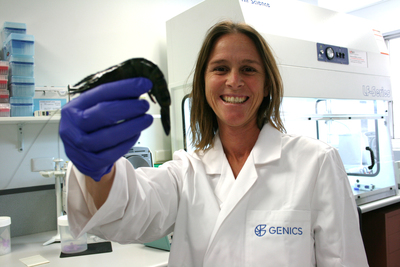Prawns get the CSIRO health check in time for Christmas

CSIRO has developed a prawn health check, using ‘Shrimp Multipath’ technology, commercialised by Brisbane start-up company Genics, which spun-out of CSIRO to tackle the global challenge of food security and quality. The health check can detect 13 commercially significant prawn diseases, including white spot syndrome, which wiped out prawn populations in 2016, and Infectious Hypodermal and Haematopoietic Necrosis Virus (IHHNV).
The health check comes as the domestic prawn industry recovers from losses from pathogens over the last three years. The technology has improved management of IHHNV, and increased production by 3.7 tonnes per hectare, or $67,000 farm gate value. Consequently, a 50-hectare Australian prawn farm could see revenues increase by more than $3 million per season.
“Australia already has some of the best prawns you can buy. However, the good news for Australian consumers ahead of Christmas is that we’re helping to grow more prawns, and make them even better. Our tests quickly help prawn farmers make informed management decisions, and for consumers this means more, high-quality, locally grown Australian prawns,” said Dr Melony Sellars, Genics CEO and former CSIRO scientist.

Around 750 hectares of prawn ponds are scattered across NSW and Qld; an increase of 3.7 tonnes per hectare could boost the yield of farmed prawns by 50%. Australia consumes all of its domestically produced prawns, with foreign imports required to meet consumer demand. The tests will allow farmers to manage prawn stocks as they grow, thereby minimising stock losses and boosting production levels, and reducing Australia’s reliance on imported prawns.
“It's great to see CSIRO science being accelerated out of the lab and into a start-up that could tackle our global food security challenge, a very clear public benefit — while also giving Aussies more prawns to enjoy with family and friends. Australian seafood is globally prized, so innovation that protects our biosecurity and boosts our domestic economy is a great example of science creating new opportunities,” said Dr Larry Marshall, CSIRO Chief Executive.
In 2016, the South East Queensland prawn industry, responsible for approximately 40% of Australia’s farmed prawns, was shut down by the foreign incursion of white spot virus, a pathogen that is lethal to prawns. Shrimp MultiPath tests against white spot, and a range of international pathogens we don’t currently have in Australia. Biosecurity agencies can use the test as a detection system to prevent the spread of any future incursions that could harm the prawn industry.

“CSIRO works with industries to secure their long-term sustainability, and commercialising this technology is a significant step towards protecting Australia’s farmed prawn industry and putting even more Australian farmed prawns on family plates. The launch of Genics is a terrific example of delivering on CSIRO’s strategy to create positive outcomes for Australia across the spectrum of consumers, industry, biosecurity and environment,” said Dr Mat Cook, CSIRO aquaculture program Research Director.
The Genics test system is predicted to benefit prawn farmers and consumers alike, with Genics delivering the technology and other prawn health diagnostic services to prawn farmers in Australia and overseas. The Genics team developed the technology by drawing on CSIRO’s aquaculture expertise, and are alumni of the national sci-tech accelerator, ON Accelerate, powered by CSIRO.
In-house ginger processing for beverage maker
A ginger beer manufacturer reduces its supply risk by investing in pack-house technology to...
Tailor-made solutions for sliced meat on show at IFFA
At this year's IFFA in Frankfurt, the MULTIVAC Group will be showing its latest line...
Five ways emerging tech can help food and beverage manufacturers
As food manufacturers embrace new innovations, they must also navigate the complex landscape of...














